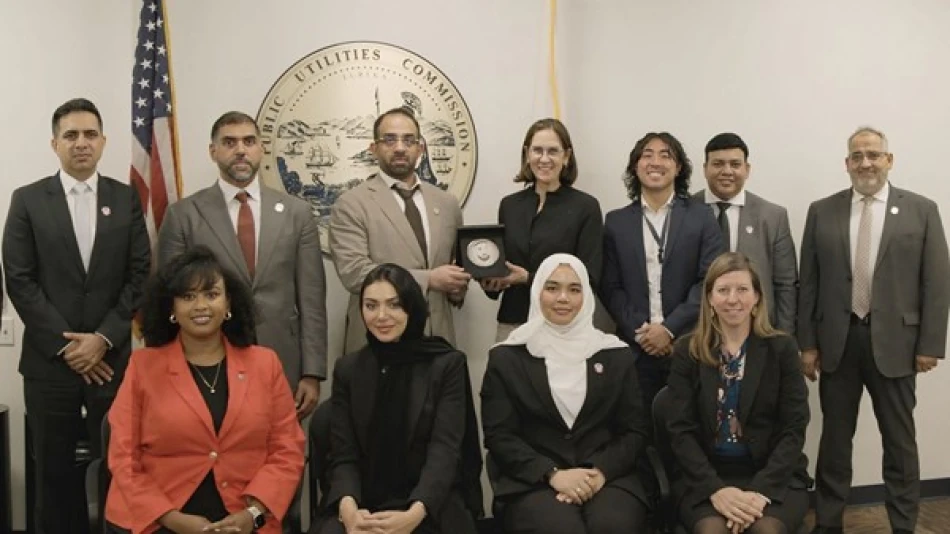
Abu Dhabi Energy Department Partners with Goldman Sachs to Boost Water Sector Growth
Abu Dhabi Strikes Landmark Water Infrastructure Deal with Goldman Sachs as Gulf States Race to Secure Resource Independence
Abu Dhabi's Department of Energy has signed its first-ever memorandum of understanding with Goldman Sachs International, marking a strategic pivot toward private capital to modernize the emirate's water infrastructure. The partnership aims to attract foreign direct investment and develop public-private collaborations for critical water projects, as the UAE positions itself as a regional hub for sustainable utilities while targeting $109 billion in energy and water investments by 2050.
A New Model for Gulf Infrastructure Financing
The agreement represents a significant shift in how Gulf states approach infrastructure development, moving beyond traditional government funding toward sophisticated financial partnerships. The collaboration will focus on deploying advanced water treatment technologies, enhancing grid resilience, and exploring asset monetization options that allow private capital to finance vital projects.
This approach mirrors successful infrastructure financing models seen in Singapore and parts of Europe, where governments have leveraged private sector expertise and capital to accelerate modernization while maintaining strategic control over critical resources.
Strategic Timing Amid Regional Water Stress
The partnership comes as Middle Eastern nations face mounting pressure to secure water independence. With the region experiencing increasing temperatures and irregular precipitation patterns, traditional desalination methods are becoming more energy-intensive and costly. Abu Dhabi's move to partner with a major investment bank signals recognition that water security requires both technological innovation and substantial capital deployment.
Dr. Abdullah Hamid Al-Jarwan, Chairman of Abu Dhabi's Department of Energy, emphasized that water security forms a fundamental part of the emirate's energy transition agenda. The collaboration aims to deliver solutions that combine economic viability with environmental responsibility and social benefit, aligning with the UAE's National Water Security Strategy 2036.
Digital Innovation Takes Center Stage
A key component of the discussions involved the development of the "AD.WE" digital platform, launched in collaboration with AIQ and Presight. This AI-powered system represents a national framework supporting digital transformation through predictive analytics for efficient resource management.
The platform positions Abu Dhabi alongside other smart city leaders like Singapore and Amsterdam, which have successfully integrated artificial intelligence into utility management. For investors, this digital infrastructure creates opportunities for data-driven efficiency improvements and predictive maintenance models that can significantly reduce operational costs.
Market Implications for Infrastructure Investors
The Goldman Sachs partnership opens new avenues for institutional investors seeking exposure to Middle Eastern infrastructure projects. With Abu Dhabi targeting 400 billion dirhams ($109 billion) in energy and water sector investments by 2050, the emirate is creating a substantial market for private equity, infrastructure funds, and pension funds looking for long-term, stable returns.
This model could prove particularly attractive to ESG-focused investors, as water infrastructure projects directly address sustainability goals while offering predictable cash flows through utility partnerships.
Technology Transfer and Knowledge Exchange
The agreement emerged from a comprehensive US tour by Abu Dhabi's energy delegation, covering California, Texas, Michigan, Massachusetts, and New York. The mission focused on regulatory best practices, advanced infrastructure development, and digital technology deployment.
Key discussion areas included smart grid regulations, renewable energy in agriculture, grid security and stability, energy storage research, and clean technology financing initiatives. This knowledge transfer approach reflects Abu Dhabi's strategy of adopting proven international models while adapting them to regional conditions.
Competitive Positioning Against Regional Rivals
The partnership positions Abu Dhabi ahead of regional competitors in attracting international financial partnerships for infrastructure development. While Saudi Arabia has focused on mega-projects like NEOM, and Qatar has emphasized LNG infrastructure, Abu Dhabi's approach of partnering with established financial institutions for utility modernization offers a more immediately scalable model.
The initiative has already resulted in joint working groups, knowledge exchange programs, and pilot projects in artificial intelligence, energy storage, and water consumption efficiency—creating a framework that other Gulf states are likely to study and potentially replicate.
Long-term Strategic Vision
Beyond immediate infrastructure improvements, the agreement supports Abu Dhabi's broader ambition to become a regional center for sustainable utilities. The partnership includes provisions for reducing network losses, expanding next-generation desalination technologies powered by clean energy, and establishing a culture of consumption rationalization.
For global markets, this represents a significant opportunity to engage with one of the world's most ambitious infrastructure modernization programs, backed by substantial sovereign wealth and guided by proven international expertise. The success of this model could establish a template for similar partnerships across the Gulf region, creating a new paradigm for infrastructure development in resource-constrained environments.
Most Viewed News

 Layla Al Mansoori
Layla Al Mansoori






